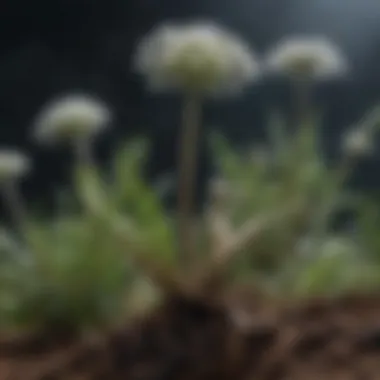Managing Anxiety Naturally with Valerian Root


Intro
The use of valerian root in managing anxiety has seen a notable resurgence over recent years, as more individuals turn towards natural alternatives in their quest for mental well-being. Traditionally, valerian root has served as a herbal remedy with roots tracing back to ancient civilizations. Its reputed calming effects have made it a popular choice, particularly among those hesitant to rely on pharmaceutical solutions, which often come laden with a host of side effects and dependency risks.
As students, researchers, and professionals navigate the labyrinth of mental health treatments, knowing about valerian root becomes not just beneficial but essential. This article aims to unravel how valerian root can be employed for anxiety management, shedding light on its functions, appropriate dosages, potential risks, and interactions with other medications.
By grasping a comprehensive understanding of valerian root, individuals stand a better chance of making informed decisions regarding their health. In a society increasingly plagued by stressors, embracing natural remedies can offer a manageable way to alleviate the burdens of anxiety.
Understanding Anxiety and Its Impact
Anxiety is not just a fleeting feeling of unease; it is a complex emotional response affecting millions worldwide. With the hustle and bustle of modern life, understanding anxiety's roots and its consequences becomes increasingly important, especially when considering natural remedies like valerian root. Knowing how anxiety manifests aids in recognizing it when one encounters it, contributing to effective management strategies.
Definition of Anxiety Disorders
Anxiety disorders encompass a range of conditions characterized by excessive fear or worry. These can vary widely; from generalized anxiety disorder (GAD), where individuals constantly feel anxious without a clear reason, to specific phobias, intense fears of particular objects or situations. According to the American Psychiatric Association, anxiety can hijack one's life, making even routine tasks daunting. Recognizing anxiety disorders is a crucial first step in seeking help and exploring treatment options, including herbal interventions like valerian root.
Common Symptoms of Anxiety
Symptoms of anxiety often spill into everyday life, manifesting in various physical and emotional signs:
- Physical symptoms: Many experience rapid heart rates, sweating, or trembling.
- Cognitive symptoms: Individuals may struggle with concentration, feel restless, or have constant thoughts racing in their minds.
- Emotional symptoms: Feelings of dread or constant worry can overshadow positive thoughts.
Each person's experience is unique, meaning some may exhibit only a few symptoms while others experience a mix. It's this intricate interplay of symptoms that can make anxiety particularly difficult to manage, emphasizing the need for comprehensive approaches, such as considering valerian root as a potential ally.
Consequences of Untreated Anxiety
Failing to address anxiety can have far-reaching consequences—both physically and mentally. Over time, untreated anxiety can lead to chronic disorders, contribute to depression, and significantly affect social interactions and relationships. Individuals may withdraw from friends or family, seeking isolation in an attempt to escape their anxious thoughts. Furthermore, the physical toll can be considerable, with a heightened risk for ailments such as hypertension or heart disease.
"Ignoring anxiety does not make it disappear; it can slowly morph into larger issues, spilling over into various facets of daily life."
With clear understanding and awareness of anxiety's impact, a discussion about tools like valerian root becomes imperative. Utilizing such natural remedies can potentially ease the burden of anxiety, contributing to a more balanced emotional state.
Intro to Valerian Root
Valerian root, a perennial herb native to Europe and parts of Asia, has garnered attention in the realm of natural remedies, particularly for its potential to ease anxiety. This section delves into the various facets of valerian root that make it significant for those seeking alternative methods of anxiety management. Its relevance extends beyond mere popularity; it encapsulates a blend of historical significance, unique chemistry, and potential therapeutic benefits that could play a crucial role in mental health care.
Botanical Background
Valerian root comes from the plant Valeriana officinalis. This herb can grow quite tall, reaching heights of up to five feet. It prefers damp soil and typically blooms with fragrant pink or white flowers. The root of the plant is the main focus when discussing its uses. The roots, often harvested in the autumn, have a strong, earthy smell that some might find unappealing.
From a botanical perspective, valerian is also interesting due to its growth habits. It tends to flourish in wild settings, often found near riverbanks and in wet meadows. Its adaptability to various soils and climates has allowed it to spread to North America where it is frequently cultivated.
Historical Usage in Traditional Medicine
Historically, valerian has been used in various cultures for centuries. The Greeks and Romans were known to use it as a herbal remedy for various ailments, including anxiety, digestive issues, and even insomnia. In medieval Europe, it gained a reputation as a treatment for nervousness and restlessness.
In modern herbal practices, valerian is often referred to as a mild sedative. It may be surprising for some to note that it was favored by many famous figures throughout history. For instance, Hippocrates documented its use, and it has even been suggested that Shakespeare referenced it in his plays. The link between valerian and sleep enhancement is particularly notable in traditional folklore, extending its usage to treating sleep disorders as well.
Chemical Composition of Valerian Root
The effectiveness of valerian can largely be attributed to its complex chemical composition. The root contains a plethora of compounds, such as valerenic acid and a range of sesquiterpenes that have been studied for their psychoactive properties. These components are thought to interact with the brain's neurotransmitters, primarily gamma-aminobutyric acid (GABA), which plays a role in regulating anxiety.
Research continues to explore the precise mechanisms through which valerian influences the nervous system, but early findings have pointed to its potential in reducing anxiety levels and improving sleep quality.
The composition isn’t just a random assortment but rather a coordinated symphony of ingredients that, working together, might produce a calming effect. Understanding what makes valerian root tick on a chemical level gives users and practitioners alike a deeper appreciation of its potential benefits and limitations.
"Valerian root's historical roots run deep, but its modern applications resonate with a growing community seeking natural ways to manage anxiety."
The journey to understanding valerian root stretches back centuries, yet it still holds promise for current endeavors in mental health management, standing at the intersection of tradition and scientific inquiry.
How Valerian Root Affects Anxiety
Understanding how valerian root interacts with anxiety is crucial for anyone considering herbal remedies. This section sheds light on the various mechanisms through which valerian root may alleviate feelings of anxiety, providing a clearer picture of its potential effects and benefits. With the rising interest in natural alternatives for mental health, grasping the significance of valerian root as a calming agent can empower individuals to make informed choices in their wellness journey.
Mechanisms of Action
Valerian root is thought to function primarily on the central nervous system, which is the engine behind our anxiety responses. Its effects are based largely on its ability to influence neurotransmitters in the brain, particularly GABA, which is often dubbed the body's natural tranquilizer. When you consume valerian root, the active compounds such as valerenic acid and valerenal bind to GABA receptors, promoting a sense of calm and relaxation.


This interaction may lead to :
- An increase in GABA availability, easing anxiety symptoms.
- A decrease in the time it takes to fall asleep—an essential factor since sleep disturbances are common among those struggling with anxiety.
- An overall reduced physiological response to stress.
Through these pathways, valerian root may help an individual feel more in control and less burdened by the weight of anxious thoughts.
Role of GABA and Other Neurotransmitters
The spotlight often shines on GABA in discussions surrounding valerian root, but it's pertinent to mention other neurotransmitters that participate in this intricate dance. GABA (gamma-aminobutyric acid) plays a pivotal role in reducing neuronal excitability throughout the nervous system, effectively calming the brain's hyperactive signals. This is why many choose valerian root in hopes of reducing anxiety's grip.
However, the interplay of other neurotransmitters can’t be ignored. For example:
- Serotonin: Sometimes referred to as the "happy hormone," serotonin significantly impacts mood. Valerian root's influence on this neurotransmitter may contribute to its anxiolytic (anxiety-reducing) properties, supporting a balanced emotional state.
- Dopamine: Often linked to feelings of pleasure and reward, dopamine’s levels may also interact with valerian extract. A well-regulated dopamine pathway aids in stabilizing mood disorders, thus benefiting those with anxiety issues.
Through the activation of GABA along with serotonin and dopamine considerations, valerian root emerges as a multifaceted approach to tackling anxiety, promoting not just a decrease in anxiety symptoms but also fostering a sense of emotional well-being.
"When it comes to managing anxiety, understanding the biological basis for how valerian root works can provide powerful insights, making it a valuable tool in one's arsenal against stress."
Determining the Right Dosage
When it comes to harnessing the potential of valerian root for anxiety management, finding the right dosage is crucial. An inappropriate dose can swing the pendulum either way; too little and it may yield negligible effects, while too much can invite unwelcome side effects. Personalized dosages consider not just the intended benefits but also the individual’s unique body chemistry, lifestyle, and the particular strain or preparation of valerian used.
Dosage is not solely about number crunching; it's about understanding how valerian root interacts within your body. Working with a healthcare provider ensures that you tread the fine line between efficacy and safety. Essentially, the right dosage can enhance its calming effects, making it a more viable option for those grappling with anxiety.
Factors Influencing Dosage
A variety of factors influence the dosage of valerian root that one might consider. These include:
- Age: As we age, our metabolism can slow down. Older individuals might require less of the active component to experience its effects compared to younger adults.
- Body Weight: Heavier individuals may need a higher dosage to achieve the same results as lighter persons because of differences in distribution throughout the body.
- Individual Sensitivity: Each person's reactions to valerian can differ greatly. Some might find relief at lower dosages, whilst others might need higher ones based on their body’s reaction to it.
- Formulation: The method of administration, whether capsules, tinctures, or teas, impacts absorption rates. For instance, tinctures might be processed differently than capsules by the digestive system, affecting the amount needed.
Evaluating these factors helps paint a clearer picture of the right dosage tailored for each person.
Recommended Dosages Based on Research
Research indicates various dosages based on the context of anxiety treatment. Generally, recommendations have surfaced from different studies, suggesting:
- Capsules: A figure typically hovers around 300 to 600 mg, consumed about half an hour to an hour prior to sleep or at times when anxiety spikes.
- Tinctures: For tinctures, anywhere from 20 to 30 drops in water up to three times a day is commonly advised, depending on potency.
- Teas: When using valerian tea, a common recommendation is steeping one teaspoon of dried valerian root in hot water for 10 to 15 minutes, consuming one to two cups daily.
Research underscores that individual experimentation, within safe limits, is often key to discovering what works best for each person.
Methods of Administration
The way valerian root is consumed can significantly impact its efficacy. Each method has its unique features, benefits, and potential downsides.
Capsules
Capsules stand as a popular choice, mainly due to their convenience. They are pre-measured, providing a consistent dosage without the need for preparation. One key characteristic of capsules is their ability to mask the somewhat earthy flavor of valerian, which some might find unappealing. The beneficial aspect is the ease of incorporation into daily routines; a capsule can be taken on the go. However, the downside could be the slower onset of effects compared to liquid forms, as they require digestion before the active ingredients can take effect.
Tinctures
Tinctures are concentrated liquid extracts, typically made from alcohol or glycerin. One benefit of tinctures is their quicker absorption, often delivering effects within minutes. They offer flexibility in dosing since users can adjust the drops to their individual needs. The distinctive quality of tinctures is their potency, usually allowing for a smaller volume to achieve the desired effect. On the flip side, tinctures might not be ideal for everyone due to their alcohol content, which might interfere with certain conditions or preferences.
Teas
Valerian root tea represents a traditional approach and is often seen as a comforting bedtime ritual. The warm infusion not only soothes but acts as a gentle way to unwind. One key characteristic of teas is their approachability; they can serve as a calming part of a nighttime routine. However, on the downside, teas can require more time to prepare compared to capsules or tinctures. The dosage might also be less precise compared to other methods, making it potentially less reliable for someone seeking consistency in their anxiety management.
In summary, the administration route matters greatly. Whether it’s through capsules, tinctures, or teas, choosing how you take valerian can set the tone for its effectiveness in your anxiety management regimen.
Potential Benefits of Valerian Root for Anxiety
Exploring the potential benefits of valerian root in the context of anxiety management sheds light on a multifaceted approach to dealing with this prevalent issue. It’s crucial to understand how this herbal remedy may alleviate symptoms of anxiety while also delving into its broader implications on well-being. As individuals seek alternative methods to cope with anxiety, valerian root stands out not only for its historical significance but also for its potential to facilitate tangible improvements in mental health.
Reduction in Anxiety Symptoms
One of the most significant advantages of valerian root is its potential to reduce anxiety symptoms. Several studies indicate that it may help to mitigate feelings of restlessness and unease. The mechanisms through which valerian root operates are primarily linked to its interaction with GABA, a neurotransmitter known for its calming effects.
"Valerian root works as a gentle sedative that may help in lowering anxiety without the heavy side effects often associated with prescription medications."


Here are some specific elements to consider regarding the reduction of anxiety symptoms:
- GABA Modulation: It is believed that valerian increases levels of GABA in the brain, potentially enhancing relaxation and reducing anxiety. The anxiolytic effects might not be instantaneous, but many users report a gradual improvement in their overall mood.
- Subjective Reports: Users often share accounts of decreased worry and tension. Anecdotal evidence suggests that regular consumption of valerian can lead to a more balanced state of mind, helping individuals manage day-to-day stressors more effectively.
- Stress-Related Disorders: For those with situational stress or anxiety disorders, valerian root may serve as a complementary treatment, supporting overall mental wellness while reducing symptoms associated with specific triggers.
Improved Sleep Quality
Another significant benefit of valerian root lies in its potential to improve sleep quality. Sleep disturbances are often closely linked with anxiety. The restless mind breeds sleepless nights, and by addressing one, it can lead to improvements in the other. Valerian root may serve as a dual-purpose remedy in this regard.
Consider the following aspects:
- Deep Sleep Promotion: Some research suggests that valerian root helps in attaining deeper levels of sleep. Improved sleep can lead to better daytime function and resilience against anxiety-provoking situations.
- Integration into Routine: Many individuals incorporate valerian root into their evening rituals, often in tea or capsule form, to promote relaxation and establish a calming routine before bed.
- Reduction of Sleep Latency: Valerian may also help in reducing the time taken to fall asleep, thus ensuring that anxiety does not stand in the way of restorative rest.
In summary, the potential benefits of valerian root for anxiety can be substantial. From reducing anxiety symptoms to improving sleep quality, its role in mental health care is multifaceted. As more individuals consider alternative and complementary therapies, valerian root offers promising possibilities.
Risks and Considerations
Understanding the risks and considerations linked to valerian root is crucial, especially when it's being explored as a remedy for anxiety management. While many people turn to natural solutions in hopes of avoiding potential side effects from pharmaceuticals, it’s vital to be aware that even natural substances can have unintended consequences. This section outlines important elements such as potential side effects, interactions with medications, and the indispensable role of healthcare guidance in the healing journey.
Potential Side Effects
Valerian root is generally recognized as safe and well-tolerated by most individuals. However, just because it's natural does not mean it is without risks. Some users have reported a range of side effects, which can include:
- Drowsiness: While many seek valerian root for its calming effects, it can cause excessive sedation or grogginess, especially if taken in larger doses or in conjunction with other sedatives.
- Headaches: A small number of individuals have mentioned experiencing headaches after consuming valerian root, possibly due to its impact on neurotransmitter levels.
- Digestive Issues: Some users complain of stomach upset or nausea, which can be bothersome and deter consistent use.
- Allergic Reactions: Although rare, some individuals may experience allergic responses, including rashes or breathing inconveniences, necessitating immediate medical attention.
It's important to keep in mind that reactions can vary greatly based on individual health conditions and sensitivities. Always start with lower doses to gauge body's response.
Contraindications with Other Medications
Valerian root, like all herbal supplements, can interact with medications leading to complications. Understanding these interactions is key for anyone considering adding it to their regimen. Some noteworthy contraindications include:
- Benzodiazepines: Combining valerian root with these anxiety medications can cause compounded sedative effects, leading to excessive drowsiness or impaired motor skills.
- Antidepressants: The calming effect of valerian root may alter the expected action of serotonergic drugs, which could lead to decreased efficacy of treatment for conditions like depression.
- Antihistamines: Mixing valerian with antihistamines can enhance drowsiness, making activities such as driving or operating machinery dangerous.
- Blood Thinners: There's possible interaction that could increase bleeding risks when used alongside anticoagulant medications like warfarin.
For anyone on prescription medications, it's essential to have an open discussion with a healthcare provider before starting valerian root to avoid potential adverse reactions.
Consultation with Healthcare Professionals
Perhaps one of the most important steps in considering valerian root for anxiety management is engaging with healthcare professionals. The value of consulting medical experts cannot be overstated. Here’s why:
- Individual Assessment: A healthcare provider can assess personal health conditions, helping identify if valerian root is suitable for you, especially if you have pre-existing conditions or concerns.
- Safe Dosage Recommendations: Professionals can provide tailored recommendations concerning dosage, effectively minimizing the risk of side effects.
- Monitoring for Side Effects: Regular follow-ups can help in identifying and managing any adverse reactions promptly, ensuring a safer experience.
- Holistic Approach: Experts can assist in crafting a comprehensive treatment plan that may include therapy, lifestyle adjustments, and other remedies, integrating valerian root into a broader health strategy.
User Experiences and Anecdotal Evidence
User experiences and anecdotal evidence add a nuanced layer to the understanding of how valerian root can mitigate anxiety. While scientific studies provide a foundation based on empirical data, personal testimonials illuminate the individual experiences that often go unnoticed in clinical settings. This section explores the significance of these narratives and offers a closer look at anecdotal evidence regarding valerian root.
Personal Accounts of Use
Personal accounts of using valerian root serve to showcase its versatile applications in daily life. Many individuals who have turned to this natural remedy often share stories that suggest it helps them achieve a more calm and centered state of mind. For example, a college student may recount how incorporating valerian tea into their nightly routine has significantly improved their sleep quality and, in turn, reduced daytime anxiety.
Another account might detail an office worker’s experience who experienced overwhelming stress during peak work periods. After trying valerian capsules, they reported feeling a marked decrease in their stress levels and a clearer focus when tackling tasks. These stories embody the essence of personal utility, shedding light on a pathway that scientific literature alone cannot forecast.
Limitations of Anecdotal Evidence
Though personal experiences offer valuable insights, one must tread carefully regarding their reliability. Anecdotal evidence often lacks the rigor of controlled studies, leading to potential biases and subjective interpretations. Notably, individual differences—such as varying physiological responses, psychological triggers, and contextual factors—can skew perceptions of valerian root’s effectiveness.
Moreover, relying solely on anecdotal evidence can promote a one-size-fits-all approach that undermines the complexity of anxiety. For instance, while one person may find success with valerian root, another might experience minimal benefits, or even adverse reactions. It’s crucial to recognize that such testimony should be viewed as supplementary rather than definitive evidence.
"Anecdotes tell stories, but they shouldn't be the sole guide for treatment. "
This distinction is particularly relevant when advocating for a natural remedy such as valerian root. Individuals are encouraged to balance personal experiences with scientific data and consultation with healthcare professionals to form a well-rounded approach to anxiety management. In navigating wellness strategies, understanding both empirical evidence and individual narratives is fundamental for making informed decisions.
Research Landscape
The exploration of valerian root in the context of anxiety management is crucial for understanding how natural remedies can play a role in mental health treatment. As more individuals turn to herbal solutions, examining the research landscape not just informs, but also empowers patients and healthcare providers alike. This understanding influences both clinical practice and personal health decisions.
The importance of this research lies in several factors:
- Evidence-Based Practice: Ensuring that claims about valerian root's effectiveness for anxiety are supported by scientific studies increases the credibility of this treatment option. It also provides a more solid foundation for those skeptical about using herbal remedies.
- Safety and Efficacy: Comprehensive research helps outline the effective dosages, potential side effects, and how valerian can interact with other medications. This knowledge is vital for mitigating risks and maximizing benefits.
- Patient Empowerment: Equipped with research-driven information, individuals can make well-informed decisions regarding their treatment options, leading to a more engaged and proactive approach to managing anxiety.


Review of Current Studies
Current studies investigating valerian root's effectiveness for anxiety reveal a complex picture. For example, a systematic review showed that certain compounds in valerian may enhance GABA’s effects in the brain, which contributes to feelings of relaxation.
- In one clinical trial involving 60 participants, those receiving valerian over a period of four weeks reported significant improvements in anxiety levels compared to the placebo group.
- Another study noted that valerian may improve sleep quality, which indirectly affects anxiety levels. Sleep and anxiety are closely intertwined, and addressing one can offer relief for the other.
However, many studies still rely on small sample sizes, which bring concerns about the generalizability of the findings. Further large-scale trials are needed to confirm these results.
Gaps in Existing Research
While there is a burgeoning interest in valerian root for anxiety, substantial gaps remain within this field. Key areas include:
- Lack of Long-Term Studies: Most existing research focuses on short-term effects. Understanding the long-term implications of using valerian root is essential for making informed choices regarding ongoing mental health treatment.
- Diverse Populations: Current studies mainly include homogeneous groups. An exploration of valerian root’s effects across diverse populations and demographics can help garner a broader understanding of its efficacy.
- Interactions with Other Therapies: There is little inquiry into how valerian interacts with more conventional therapies, such as cognitive-behavioral therapy. This information could be invaluable for patients considering combining treatments.
In summary, while preliminary research is promising, a more extensive and rigorous body of work is needed to fully appreciate the role of valerian root in anxiety management. As the landscape of research evolves, so too can our understanding and utilization of this herbal remedy.
Integrating Valerian Root into Treatment Plans
In recent years, the integration of natural remedies into healthcare has become increasingly significant. Valerian root, known for its calming properties, can play a crucial role in managing anxiety when blended carefully with other treatment protocols. This integration isn't merely an exercise in mixing various approaches; it’s about forming a cohesive strategy that addresses both the physical and psychological aspects of anxiety.
Combination with Other Therapies
When considering the incorporation of valerian root, it's vital to look at how it interacts with different therapeutic approaches. This could mean utilizing valerian alongside cognitive behavioral therapy (CBT), which is widely recognized for its effectiveness in treating anxiety disorders. For instance, while a person engages in behavioral strategies learned through CBT, valerian could help decrease the physiological symptoms, such as a racing heart or sweaty palms, allowing the individual to better focus on the therapeutic work at hand.
Moreover, the combination of valerian with mindfulness practices can amplify the overall benefits. Imagine coupling valerian’s calming effects with meditation. This harmonious pairing can create a more tranquil state of mind, which could facilitate an easier entry into meditation. Such combinations need careful consideration, as balancing natural remedies with professional therapies may enhance results, turning an anxious mind into a calmer one.
Lifestyle Modifications to Enhance Efficacy
Integrating valerian root effectively also involves lifestyle adjustments.
Regular Physical Activity
Engaging in regular movement can significantly modulate anxiety. Physical activity helps in regulating neurotransmitters, which can complement valerian's effects.
- Walking, jogging, or yoga can maintain a steady flow of endorphins, which might enhance the effects of valerian root.
- Strive to include at least 30 minutes of exercise a day, whether that's a brisk walk or a more structured class.
Nutrition
A balanced diet plays a role in emotional health. Certain foods can bolster the calming aspects of valerian root.
- Including omega-3 fatty acids found in fish like salmon can promote optimal brain function.
- Nuts and seeds can help stabilize blood sugar, which may prevent spikes that can trigger anxiety.
Sleep Hygiene
Establishing a routine for sleep can boost valerian root's effectiveness. As valerian is commonly used for its ability to improve sleep quality, incorporating good sleep practices can create a synergistic effect. A few pointers include:
- Set a regular sleep schedule, aiming to rest at the same time each night.
- Create a calming bedtime routine free of screens to wind down before sleep.
By adopting these lifestyle enhancements, individuals may find a greater reduction in anxiety symptoms when integrating valerian root into their treatment plans.
"The journey towards managing anxiety is often multifaceted. It’s about creating a patchwork of strategies that suits an individual’s unique needs."
Integrating valerian root into a wider treatment plan is not so much about making drastic changes but rather about refining one’s approach to health. Individuals should always consult healthcare professionals to tailor a plan that’s both safe and effective.
End and Future Directions
As we wrap up our exploration of valerian root and its potential role in anxiety management, it’s crucial to reflect on the insights shared thus far and consider what this means for the future.
The discussion on valerian root highlights its historical and contemporary significance as a herbal remedy. Evidence suggests it can effectively ease anxiety symptoms and improve sleep quality, which are significant aspects of mental health. By focusing on a holistic approach, we acknowledge that remedies like valerian root can complement established treatments and provide individuals with options to manage their mental health more effectively.
Summary of Key Points
This article has synthesized a range of important topics related to valerian root:
- Understanding Anxiety: Recognizing the dimensions of anxiety disorders is critical in tailoring treatments that fit individual experiences.
- Mechanisms of Action: This piece demonstrated how valerian root interacts with neurotransmitters, particularly GABA, offering insight into its calming effects on the nervous system.
- Dosages and Methods of Administration: Proper dosage is essential for effectiveness, underscoring the necessity for individuals to consider their unique needs and seek professional guidance.
- Potential Benefits and Risks: While the benefits are notable, so too are the risks, especially regarding interactions with other medications. The need for consultation with healthcare practitioners cannot be overstated.
- User Experiences: Individual anecdotes shed light on the real-world applications and limitations of valerian root, signifying the importance of diverse evidence in alternative medicine.
Incorporating these key points, one can better appreciate the complexity of using valerian root in anxiety management. It also stresses the notion that while valerian root offers promise, it is not necessarily a universal solution.
Recommendations for Further Research
Moving forward, this topic requires further investigation to solidify our understanding and address existing gaps:
- Long-term Studies: While some short-term studies exist, comprehensive, long-term analysis can provide deeper insights into the sustained effects and safety of valerian root.
- Diverse Population Studies: Most research has focused on specific demographic groups. Including diverse populations can uncover variations in efficacy related to genetic, environmental, and behavioral factors.
- Mechanistic Studies: Greater focus on the biochemical pathways involved in valerian’s action can help clarify how it interacts with other medications and supplements, allowing for more informed recommendations.
- Comparative Studies: Direct comparisons between valerian root and other common treatments for anxiety may yield relevant data, potentially validating its use as a complementary therapy.
In summary, the investigation into valerian root's effectiveness is still unfolding. With rigorous research efforts, we can hope for a clearer understanding that supports its responsible integration into anxiety management strategies for a broader audience. The aim is to create a future where individuals are empowered, informed, and capable of making holistic choices about their mental wellness.















